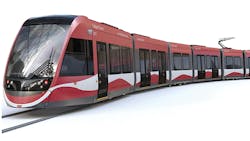The city of Calgary in Alberta, Canada, has awarded a contract to CAF to supply light-rail vehicles for the city’s Green Line Light-Rail Transit (LRT) Project – the largest infrastructure project in Calgary’s history.
The 20-km (12.4-mile) LRT project will be constructed in two phases with the first connecting 18 kms (11.18 miles) between Shepard to Eau Clare. The second phase will construct the final two kilometers (1.24 miles) from Eau Clare to 16 Avenue North.
“Awarding this contract is a major project milestone and step forward in delivering Calgary’s next LRT,” said Darshpreet Bhatti, Green Line CEO. “CAF’s proposal met all of the city’s technical and commercial requirements and their Urbos 100 LRVs offer proven modern low-floor technology adding excellent value for Calgarians. CAF in an industry leader and this new fleet will provide Calgary with a world class transit option.”
CAF is familiar brand globally with more than 40 projects across five continents, but the Green Line LRVs will be the first project the company has completed in Canada. While the vehicle manufacturer may be new, the technology built into the LRV is well proven with low-floor LRVs across Canada and the United States.
CAF will supply 28 modern, low floor Urbos 100 vehicles for the project, which Calgary explains will improve accessibility, reduce station footprint and enhance safety for pedestrians and vehicles. The contract includes tools and support for operating and maintaining the new fleet and includes an option to procure additional vehicles for future phases of the Green Line project.
"CAF is extremely grateful to the city of Calgary for choosing our company as a major partner for the future Green Line LRT Project, the city's most important infrastructure project to date,” said Jesús Esnaola Altuna, CAF general chief sales officer “We are extremely committed and enthusiastic about this project and would like to draw attention to the transparency of the bidding process as well as the professionalism shown by Calgary’s project team.”
When the first phase of the project opens, it is expected to connect more than 55,000 riders to Calgary’s transit network.
About the Author

Mischa Wanek-Libman
Group Editorial Director
Mischa Wanek-Libman is director of communications with Transdev North America. She has more than 20 years of experience working in the transportation industry covering construction projects, engineering challenges, transit and rail operations and best practices.
Wanek-Libman has held top editorial positions at freight rail and public transportation business-to-business publications including as editor-in-chief and editorial director of Mass Transit from 2018-2024. She has been recognized for editorial excellence through her individual work, as well as for collaborative content.
She is an active member of the American Public Transportation Association's Marketing and Communications Committee and served 14 years as a Board Observer on the National Railroad Construction and Maintenance Association (NRC) Board of Directors.
She is a graduate of Drake University in Des Moines, Iowa, where she earned a Bachelor of Arts degree in Journalism and Mass Communication.
